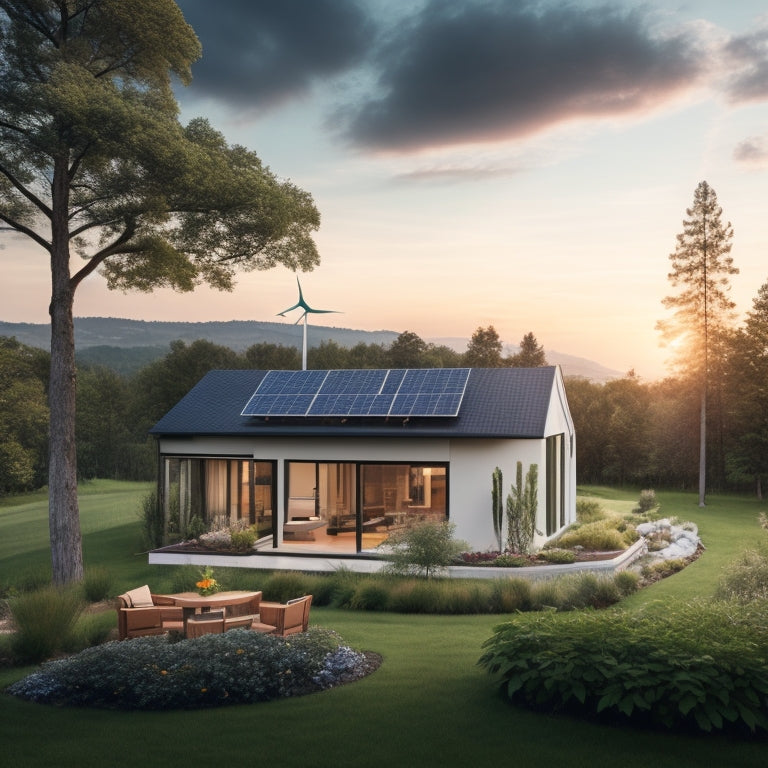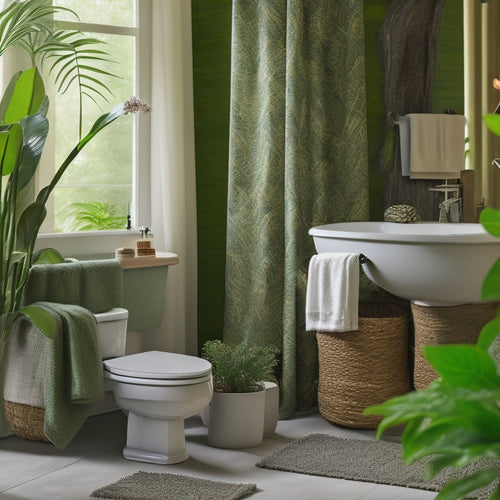
Why Optimize Your Home's Green Energy Performance?
Share
By optimizing your home's green energy performance, you can markedly reduce your carbon footprint, lower your energy bills, and increase your property's value. By integrating renewable energy sources, upgrading to energy-efficient appliances, and streamlining energy usage through home automation, you'll not only decrease your reliance on grid electricity but also enhance your home's resale value. Additionally, you'll be contributing to environmental protection, conserving natural resources, and promoting sustainable living. As you begin to investigate the benefits of optimizing your home's green energy performance, you'll uncover even more ways to create a more sustainable, energy-independent future for yourself and your community.
Key Takeaways
- Optimizing green energy performance reduces carbon footprint and contributes to environmental protection.
- Energy-efficient homes increase resale value and appeal to environmentally conscious buyers.
- Integrating renewable energy sources and smart home technology minimizes energy consumption and lowers energy bills.
- Real-time energy performance tracking identifies areas of improvement and enables data-driven decisions.
- Achieving energy independence through green energy performance enhances energy security and promotes sustainable living.
Boosting Home Energy Efficiency
With energy consumption being a considerable contributor to greenhouse gas emissions, optimizing your home's energy efficiency is an essential step towards reducing your carbon footprint.
By conducting energy audits, you'll identify areas where energy is being wasted and pinpoint opportunities for improvement.
Additionally, integrating renewable energy sources like solar and wind power into your home's energy infrastructure can greatly reduce your reliance on traditional grid electricity.
Home automation systems can also help you streamline energy usage by controlling lighting, heating, and cooling systems remotely.
Additionally, installing energy-efficient appliances and insulation can greatly reduce energy consumption.
By taking these steps, you'll not only lower your energy bills but also contribute to a more sustainable future.
Reducing Carbon Footprint Matters
One significant benefit of optimizing your home's energy efficiency is that it directly reduces your carbon footprint. By doing so, you're taking an essential step towards a more sustainable future.
Every unit of energy you save translates to a corresponding decrease in greenhouse gas emissions. This, in turn, helps mitigate climate change and its devastating consequences.
As seen in Renewable Energy Sources, approximately 80% of EV energy can be sourced from renewables, making a significant impact on the environment. Shifting to renewables enhances energy security and resilience, further supporting a sustainable lifestyle.
To further minimize your impact, consider adopting carbon offset strategies, such as investing in renewable energy projects or reforestation initiatives.
Green Energy Savings Potential
Regularly, homeowners can access significant energy savings by optimizing their home's green energy performance. You can benefit from reduced energy bills and lower your reliance on non-renewable energy sources.
By incorporating sustainable energy technology, such as solar panels and energy-efficient appliances, you can minimize your energy consumption. Additionally, you may be eligible for green energy incentives, like tax credits or rebates, which can offset the initial investment costs.
As renewable energy solutions become more prevalent, achieving energy independence and reducing carbon footprint become increasingly important. By optimizing your home's green energy performance, you'll not only reduce your energy expenses but also contribute to a cleaner, more sustainable environment.
With the right strategies and technologies, you can release substantial energy savings and enjoy greater freedom from energy costs.
Enhanced Home Value Benefits
Two significant benefits of optimizing your home's green energy performance are an increase in its resale value and an enhancement in its appeal to potential buyers.
By incorporating sustainable landscaping and energy-efficient appliances, you're not only reducing your carbon footprint but also making your home more attractive to environmentally conscious buyers. This can lead to a higher selling price and faster sale.
Additionally, energy-efficient features can be a major selling point, especially for millennials who prioritize sustainability.
By integrating renewable energy sources, such as solar power, and reducing reliance on fossil fuels, you're investing in its future value and appeal.
This can give you a competitive edge in the real estate market, ultimately leading to a quicker and more profitable sale.
Optimizing Renewable Energy Sources
By incorporating renewable energy sources into your home's green energy performance, you're taking a significant step towards reducing your reliance on fossil fuels and minimizing your carbon footprint.
This can be achieved through various means, including:
-
Solar panel integration and wind turbine installation to generate electricity from natural sources, such as electric vehicle charging stations for hybrid electric fleet solutions.
-
Geothermal heating and hybrid energy systems to reduce your dependence on traditional HVAC systems, which can be further enhanced by incorporating biodiesel fuel systems for cleaner energy generation.
-
Battery storage solutions and energy management systems to optimize energy usage and reduce waste.
Smarter Energy Consumption Habits
Optimizing your daily habits is essential to achieving a greener home energy performance, as it directly impacts your energy consumption and subsequent environmental footprint. By conducting energy audits, you can identify areas for improvement and make behavioral changes to reduce your energy usage.
Investing in eco-friendly appliances and smart thermostats can also greatly lower your energy consumption. Effective energy management involves adopting conservation practices, such as turning off lights during peak usage hours, and integrating technology to optimize your energy use.
In addition, incorporating solar panels to decrease grid reliance and lower carbon footprint harnessing solar power can also contribute to a sustainable lifestyle. Moreover, utilizing high-efficiency inverters to minimize energy losses and costs can additionally reduce your environmental impact.
Real-Time Energy Performance Tracking
You can gain significant understandings into your energy use patterns by tracking your home's energy performance in real-time.
Live energy monitoring systems provide instantaneous data on your energy consumption, helping you identify areas of inefficiency and opportunities for improvement.
Energy Use Patterns
Real-time energy performance tracking enables homeowners to understand the intricacies of their energy use patterns, revealing opportunities to refine their green energy performance.
By analyzing your energy consumption, you can identify areas of inefficiency and make data-driven decisions to optimize your energy usage. This thorough energy consumption analysis allows you to:
- Pinpoint appliances and devices with high energy usage trends
- Identify opportunities to adjust your daily habits to reduce energy waste
- Develop a detailed strategy to minimize your carbon footprint
With this knowledge, you can take control of your energy usage, reducing your environmental impact and saving money on your utility bills.
Live Energy Monitoring
Analyzing your energy consumption patterns is just the first step; taking it a step further with live energy monitoring permits you to track your energy performance in real-time.
You'll have access to real-time analytics, allowing you to identify areas of inefficiency and make data-driven decisions to optimize your energy usage.
Energy management systems integrate with your smart home, providing energy consumption trends and forecasts, so you can adjust your habits accordingly.
User-friendly interfaces and remote monitoring solutions guarantee you're always in control, no matter where you are.
Data visualization tools help you understand complex energy usage patterns, enabling you to take action and unleash a more sustainable, energy-efficient future.
Achieving Energy Independence Goals
Energy self-sufficiency, a hallmark of a truly green home, hinges on achieving energy independence goals.
You can take control of your energy usage by implementing energy autonomy strategies that reduce your reliance on the grid. This not only reduces your carbon footprint but also provides self-sufficiency advantages, such as:
- Reduced energy bills
- Increased energy security
- Enhanced resilience to power outages
Frequently Asked Questions
Can I Optimize My Home's Energy Performance on a Limited Budget?
You can optimize your home's energy performance on a limited budget by exploring budget-friendly solutions like DIY improvements, such as sealing air leaks, adding insulation, and upgrading to energy-efficient lighting and appliances.
How Do I Balance Energy Efficiency With Aesthetics in Home Design?
You balance energy efficiency with aesthetics by incorporating sustainable materials and staying on top of design trends, like passive house principles, to create a beautiful, eco-friendly space that reflects your personal style and promotes freedom from environmental guilt.
Are Energy-Efficient Appliances Truly More Environmentally Friendly?
You'll be surprised to know that energy-efficient appliances use 10-50% less energy than traditional ones! When you choose them, you'll enjoy significant energy savings and a longer appliance lifespan, making a real environmental impact without sacrificing your independence.
Can I Optimize Energy Performance in a Rented or Leased Property?
You can optimize energy performance in a rented or leased property by reviewing your rental agreements, understanding tenant rights, and negotiating with your landlord to implement energy-efficient upgrades that benefit both you and the environment.
Do Energy-Efficient Upgrades Require Frequent Maintenance?
You're wondering if energy-efficient upgrades require frequent maintenance? Consider the LEED-certified Empire State Building, which saves $4.4 million annually with minimal upkeep. By following energy saving tips and creating maintenance schedules, you'll enjoy long-term benefits with minimal hassle.
Related Posts
-

Sustainable Scrubbing: Top Bathroom Solutions for Earth-Conscious Homes
You're taking an important step towards creating a more sustainable home by switching to eco-friendly bathroom cleani...
-

What Are Natural Clay Paints for Green Home Interiors?
You're about to uncover a game-changing alternative to synthetic paints that not only enhances the aesthetic of your ...
-

10 Best Energy-Efficient External Hard Drives for Sustainable Offices
When it comes to sustainable offices, you need external hard drives that balance data storage needs with energy effic...


